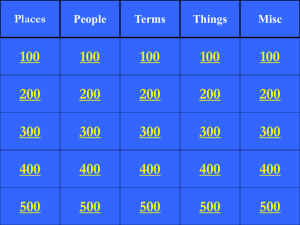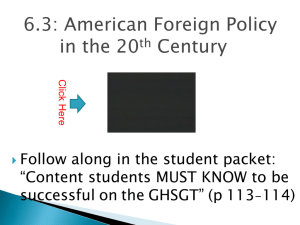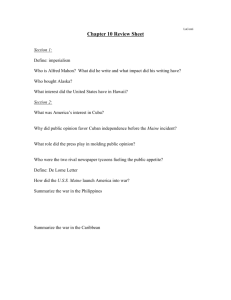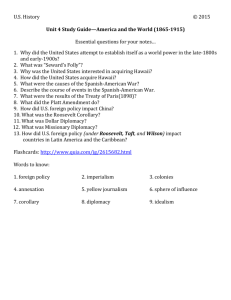Chap 5 Becoming a World Power Assignment Packet
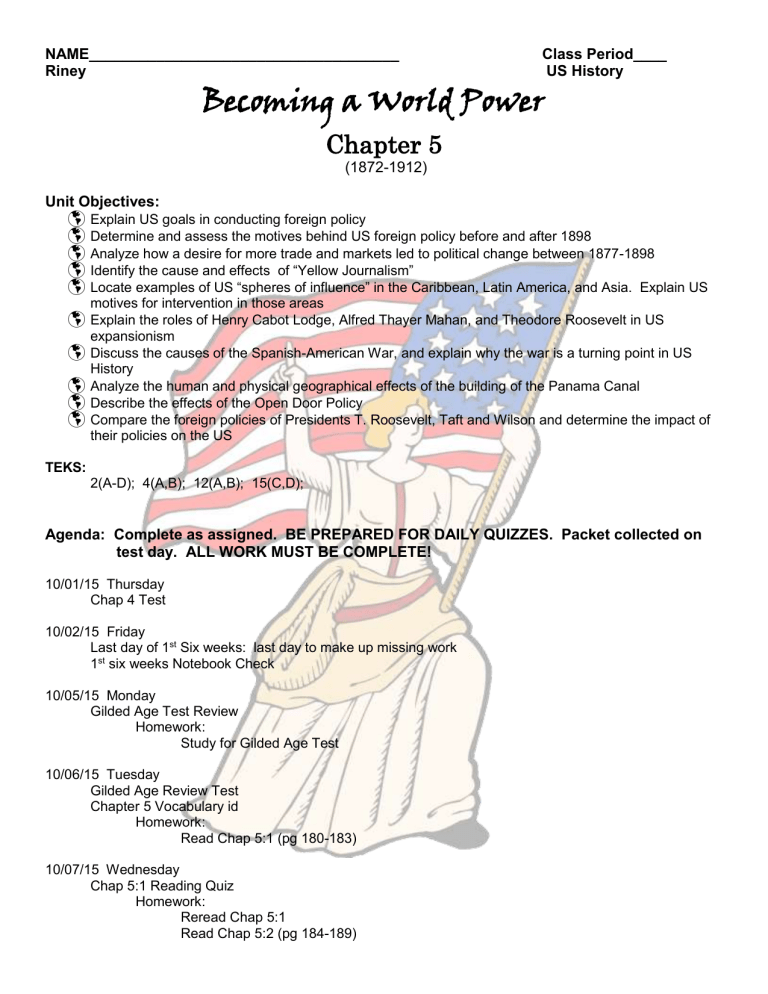
NAME_____________________________________
Riney
Class Period____
US History
Becoming a World Power
Chapter 5
(1872-1912)
Unit Objectives:
Explain US goals in conducting foreign policy
Determine and assess the motives behind US foreign policy before and after 1898
Analyze how a desire for more trade and markets led to political change between 1877-1898
Identify the cause and effects of “Yellow Journalism”
Locate examples of US “spheres of influence” in the Caribbean, Latin America, and Asia. Explain US motives for intervention in those areas
Explain the roles of Henry Cabot Lodge, Alfred Thayer Mahan, and Theodore Roosevelt in US expansionism
Discuss the causes of the Spanish-American War, and explain why the war is a turning point in US
History
Analyze the human and physical geographical effects of the building of the Panama Canal
Describe the effects of the Open Door Policy
Compare the foreign policies of Presidents T. Roosevelt, Taft and Wilson and determine the impact of their policies on the US
TEKS:
2(A-D); 4(A,B); 12(A,B); 15(C,D);
Agenda: Complete as assigned. BE PREPARED FOR DAILY QUIZZES. Packet collected on
test day. ALL WORK MUST BE COMPLETE!
10/01/15 Thursday
Chap 4 Test
10/02/15 Friday
Last day of 1 st Six weeks: last day to make up missing work
1 st six weeks Notebook Check
10/05/15 Monday
Gilded Age Test Review
Homework:
Study for Gilded Age Test
10/06/15 Tuesday
Gilded Age Review Test
Chapter 5 Vocabulary id
Homework:
Read Chap 5:1 (pg 180-183)
10/07/15 Wednesday
Chap 5:1 Reading Quiz
Homework:
Reread Chap 5:1
Read Chap 5:2 (pg 184-189)
10/08/15 Thursday
Chap 5:2 Reading Quiz
Chap 5 Notes
Homework:
10/09/15 Friday
Chap 5 Video Shorts
Early Release
Reread Chap 5:2
10/12/15 Monday
Columbus Day: No School
10/13/15 Tuesday
Chap 5 Notes
Biography: Sanford Dole
10/14/15 Wednesday
PSAT
Becoming a World Power Video
10/15/15 Thursday
Chap 5 Notes
Yellow Journalism Assignment
Homework:
Complete Yellow Journalism Assignment
10/16/15 Friday
Chap 5 Notes
Primary Source Comparison: To Annex or Not to Annex (The Philippines)
Homework:
Read Chap 5:3 (pg 190 -195)
Take online 5:3 Quiz. Email to criney@misd.org
10/19/15 Monday
Chap 5 Notes
Becoming a World Power Map Assignment
Homework:
Chapter 5 Test Review
10/20/15 Tuesday
Chap 5 Test Review
Homework:
Study for Chap 5 Test: Becoming A World Power
10/21/15 Wednesday
Chap 5 Test: Becoming a World Power
Homework:
Read Chap 6:1 (pg 202-210)
Chapter 5: Becoming a World Power (1872-1917)
Lesson 1: The Imperialist Vision (pg 180-183)
Vocabulary :
Content Vocabulary and Concepts :
Imperialism : the actions used by one nation to exercise political or economic control over a smaller or weaker nation
Protectorate : a country that is technically independent but is actually under the control of another country
Anglo-Saxonism : the idea that English speaking nations had superior character, ideas, and systems of government and were therefore destined to dominate the planet
Academic Vocabulary
Expansion : the act or process of increasing or enlarging the extent, number, volume, or scope
Domestic : existing or occurring inside a particular country; not foreign or international
Colony : a country or area under the political control of another country, typically a distant one, and occupied by settlers from that country
Missionary : a person who is sent to a foreign country to do religious work (such as to convince people to join a religion or to help people who are sick, poor, etc.)
Assertive : confidently aggressive or self-assured
Negotiate : try to reach an agreement or compromise by discussion with others
Recession : a period of temporary economic decline during which trade and industrial activity are reduced
Exclusive : available to only one person or group
Subsidy : Monetary assistance granted by a government to a person or group in support of an enterprise regarded as being in the public interest
Ascend : to rise to a higher point, rank or degree
Annex : to formally add on
People to Know
Alfred T. Mahan Sanford B. Dole Queen Liliuokalani
Theodore Roosevelt
Matthew Perry
Reading Guide
Main Idea : During the late 1800s, the desire to find new markets, increase trade, and build a powerful navy caused the United States to become more involved in international affairs
Why it matters now : The United States remains a world political, economic, and military power. It remains in possession of certain overseas territories, and the debate regarding their future status continues.
When reading, focus on the following:
Americans’ support for expansionism and imperialism
American business and trade interests
Anglo-Saxonism
Reasons for expanding naval capabilities
Trade agreement with Japan secured
Hawaii and Samoa become US territories
Lesson 2: The Spanish-American War (pg 184-189)
Vocabulary :
Content Vocabulary and Concepts :
Yellow Journalism : type of sensational, biased, and often false reporting for the sake of attracting readers
Autonomy : the quality of or state of being self-governing
Jingoism : extreme nationalism marked by aggressive foreign policy
Academic Vocabulary
Guerilla : a member of an armed band that carries out surprise attacks and sabotage rather than open warfare
Atrocity : an extremely wicked or cruel act, typically one involving physical violence or injury
Neutral : not helping or supporting either side in a conflict, disagreement, etc
Intervene : to get involved in the affairs of another
Blockade : the isolation by a warring nation of an enemy area (as a harbor) by troops or warships to prevent passage of persons or supplies
Volunteer : person who joins the military by choice
Consent : permission for something to happen or agreement to do something
Prominent : important, famous
Inconsistent : something that is not uniform or not the same throughout
Amendment : an alteration of or addition to a motion, bill, constitution
Commonwealth : a political unit that is like a U.S. state but that pays no federal taxes and has only a representative in Congress who does not vote
Surge : to suddenly increase to an unusually high level
Stimulate : to rouse to action or effort, as by encouragement or pressure; spur on; incite
Emilio Aguinaldo
William McKinley
People to Know
William Randolph Hearst vs Joseph Pulitzer
Date to Know
Theodore Roosevelt
1898
: With the defeat of the Spanish in the Spanish-American War, the US becomes a world power with an overseas empire
Reading Guide
Main Idea : During the Spanish-American War, the United States defeated Spanish troops in Cuba and the Philippines. Afterward, the United States annexed the Philippines and became an imperial power
Why it matters now : In addition to acquiring territory that the US still holds today, the Spanish-
American War established the US as a dominant power in Asia. The success of the US Navy led to further military enhancements, additional ships, an interoceanic canal as well as the modernization of the US Army.
When reading, focus on the following:
Causes of the Spanish-American War
The War on Two Fronts
The Annexation Debate
1898 as a Turning Point in US History
The status of Puerto Rico
Philippines Insurrection 1898-1902
The Economic Effects of the Spanish-American War
Lesson 3: New American Diplomacy (pg 190-195)
Content Vocabulary and Concepts :
Sphere of Influence : section of a country where a foreign nation enjoys special rights and powers
Open Door Policy : a policy that allowed each foreign nation in China to trade freely in the other nations’ spheres of influence
Dollar Diplomacy : a policy of joining the business interests of a country with its diplomatic interests abroad
Guerillas : armed fighters who carry out surprise attacks etc
Academic Vocabulary
Commerce : trade
Leasehold : an interest in real property in which the leaseholder doesn't own a specific piece of property but possesses a long-term lease
Convert : a person who has been persuaded to change their religious faith or other beliefs
Access : freedom or ability to obtain or make use of
Lucrative : producing a great deal of profit
Resolution : an official decision that is made, usually after a group or organization has voted
Deter : to discourage or restrain from acting or proceeding
Acquisition : something acquired or gained
Tension : friction or opposition between groups
Locks : a short confined section of a canal or other waterway in which the water level can be changed by the use of gates and sluices, used for raising and lowering vessels between two gates.
Intervene : to interfere usually by force or threat of force in another nation's internal affairs
Corollary : a proposition that follows from (and is often added to) one already in existence
Diplomacy : the art and practice of conducting negotiations between countries
Customs : the duties levied by a government on imported goods.
Mediation: intervention in a dispute in order to resolve it; arbitration
Expedition : a journey undertaken by a group of people with a particular purpose
Ridicule : the act of making fun of someone or something in a cruel or harsh way
Theodore Roosevelt
People to Know
William H. Taft Dr. William Gorgas
Reading Guide
Main Idea : The United States’s influence continued to expand into foreign countries. President
Theodore Roosevelt mediated disputes in Asia and Latin America and acquired the Panama Canal
Zone. Presidents Taft and Wilson increased U.S. trade and influence in Latin America
Why it matters now : The United States emerged from the Spanish American War as a World Power, and since then, its influence has grown even more. US foreign policy plays a major role in affecting world affairs today.
When reading, focus on the following:
Trade with China and the Open Door Policy
The Boxer Rebellion
The Acquisition of the Panama Canal
Geographic Challenges to the construction of the canal
The Roosevelt Corollary to the Monroe Doctrine and US intervention in Latin America
Big Stick Diplomacy
Dollar Diplomacy
Yellow Journalism Quick Write Assignment: Thursday Oct 15
With a partner, use pages 184 and 185 from the textbook to write a newspaper article employing
Yellow Journalism techniques. You may choose to write about any of the following events that led to the Spanish-American War (explosion of the USS Maine or the Spanish treatment of the Cuban people). This article should be one paragraph in length and a minimum of 50 words . Alternate assignment, ( must have teacher approval – NO PARTNER ): Draw an editorial cartoon covering one of the incidents listed above. This too must employ Yellow Journalism
I’m a STAAR!
What’s my Claim to Fame?
Sanford Dole
Era : US Becomes a World
Power
Why I’m Famous:
Alfred T. Mahan
Era : US Becomes a World
Power
Why I’m Famous:
Spanish American War Map Assignment
Before the Spanish American War of 1898
You will need two colors, not BLUE Label and color the following countries according to their status before the Spanish-American War of 1898: Spain, USA, Philippines, Guam,
Puerto Rico, Cuba
Color #1 = Spain and Spanish Colonies
Color #2 = USA
After the Spanish American War of 1898
You will need any three colors, but no BLUE ( two should be the same as previous map).
Label and color the following countries according to their status after the Spanish-
American War of 1898: Spain, USA, Philippines, Guam, Puerto Rico, Cuba
Color #1 = Spain and Spanish Colonies Color #3 = Independent as a result of war
Color #2 = USA and US Colonies
The US Becomes a
World Power
You will need two colors for this assignment. The first color must be the same that you used to identify the
United States in the Spanish-American War Map Assignment.
1. Color and label (and draw in borders if necessary) all US property as of 1904 (Alaska,
Hawaii, Guam, Samoa, Wake Island, Midway Island, Philippines, Puerto Rico, the Panama Canal
Zone & the US)
2. With a pen, include the following labels a. For US territory that was purchased, label with a $ b. For US territory that was won as a result of the Spanish-American War, label with a c. For US territory that was acquired through Imperialist actions and annexed, label with an IA d.
For US territory that was uninhabited and claimed, label with a C
3. With the color blue, label the following bodies of water: Pacific Ocean, Atlantic Ocean, Caribbean
Sea
The Philippines: To Annex or Not to Annex
Primary Source Analysis
Instructions: Read the following primary source quotes. Analyze each to determine whether the author was in favor of or against the annexation of the Philippines and why. Use SOAPS strategy boxes
1.
“The Opposition tells us that we ought not to govern a people without their consent. I answer, The rule of liberty that all just government derives its authority from the consent of the governed applies only to those who are capable of selfgovernment. We govern the Indians without their consent, we govern our territories without their consent, we govern our children without their consent … Would not the people of the Philippines prefer the just humane, civilizing government of this Republic to the savage, bloody rule of pillage and extortion from which we have rescued t hem?”
- From The Meaning of the Times Senator Albert J. Beveridge United States Senator
2.
“A harbor and coaling station in the Philippines would answer every trade and military necessity and such a concession could have been secured at any time without difficulty. It is not necessary to own people in order to trade with them. We carry on trade today with every part of the world, and our commerce has expanded more rapidly than the commerce of any European empire. … Imperialism finds no warrant in the Bible. The command ‘Go ye into all the world and preach the gospel to every creature’ has no Gatling gun attachment …”
- From Speeches of William Jennings Bryan
3.
“When I next realized that the Philippines had dropped into our laps I confess I did not know what to do with them. I sought counsel from all sides —Democrats as well as Republicans—but got little help. . . . And one night late it came to me this way —I don’t know how it was, but it came: (1) That we could not give them back to Spain—that would be cowardly and dishonorable; (2) that we could not turn them over to France and Germany —our commercial rivals in the
Orient —that would be bad business and discreditable; (3) that we could not leave them to themselves—they were unfit for self-government —and they would soon have anarchy and misrule over there worse than Spain’s was; and (4) that there was nothing left for us to do but to take them all, and to educate the Filipinos, and uplift and civilize and Christianize them, and by God’s grace do the very best we could by them, as our fellow-men for whom Christ also died."
—James Rusling, “Interview with President William McKinley,” The Christian Advocate , January 1903
1. SOAPS
Subject:
Occasion:
Audience:
Purpose:
Speaker:
2. SOAPS
Subject:
Occasion:
Audience:
Purpose:
Speaker:
3. SOAPS
Subject:
Occasion:
Audience:
Purpose:
Speaker:
Which speakers are in favor of the Annexation of the Philippines?
Does the US Annex the Philippines or not?
What is the status of the Philippines today (look it up):
